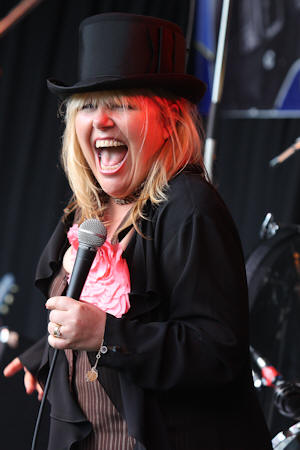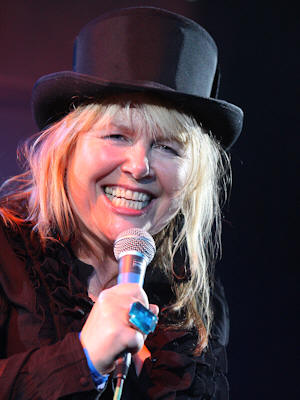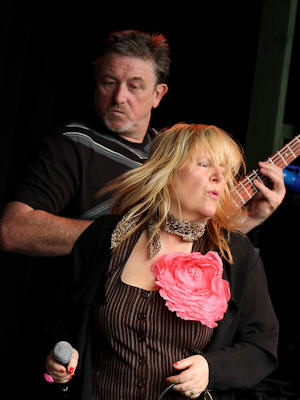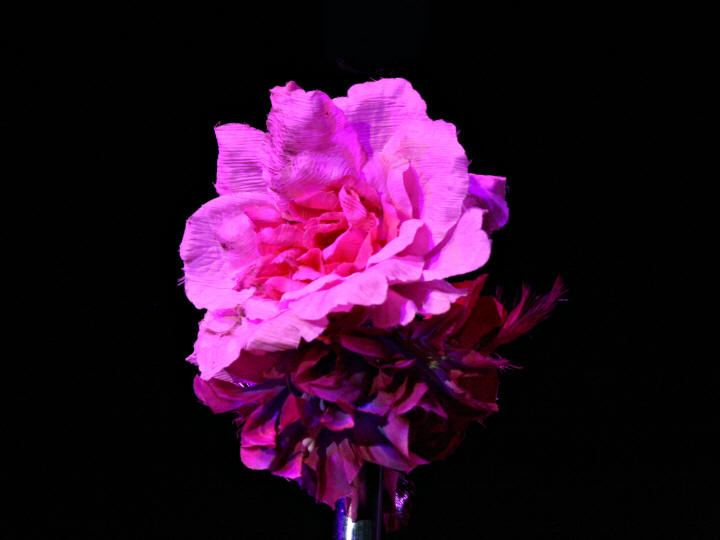
Painting © 2004 Loz
Arkle
Website
© Copyright 2000-2011 Alan White - All
Rights Reserved
Site optimised for Microsoft Internet Explorer



Early Blues Interview |
|
Connie Lush played the Linton Music Festival in June 2009 and I caught up with her after the set.
Connie: My mother was in a Record Club and she used to get the Top 10 every week. Sheíd send me to the shop and I would get the current charts every Saturday, bring it home and weíd play them all the time. Her favourite was Lonnie Donegan so I knew quite a lot of his stuff, as well as Brenda Lee and Ray Charles. She loved ballads and skiffle and I used to think that was Liverpool. Alan: Did you always want to become a singer? Connie: No, not really. I always wanted to become an artist of some sort, working with designs, colours, fabrics. I used to design a lot of hats for Olive Oil! I was always singing, but it never entered my head that itíd be a career. Alan: So how did you start in music? Connie: My husband Terry, our bass player, was already in the band . Everybody was waiting for me to make the decision to become a singer, it wasn't a surprise to anyone other than me. Alan: So what kind of material were you singing in the early days? Connie: It was very much Little Feet, Bonnie Raitt, stuff like that, anything with a funky edge to it. Then we went into pop a bit more. Along the way I got more and more interested in blues but that didnít happen until quite late on. Alan: And then what first attracted you to the blues? Connie: Iíd been meeting all these people at gigs and theyíd kept telling me about the blues scene, saying that I had the voice and should get on there as a British girl Scouser. I went and auditioned at Colne and stood in the queue with John Lewis on guitar for Perry Fosterís famous acoustic sessions. It was a good gig really and it all started from there. Alan: Good old Perry! Great man! Connie: I still see Perry to this day and we are good friends. Alan: Who are your favourite blues artists? Connie: John Lee Hooker is a huge personal pull for me. People wouldnít think it but I get a lot of personal feeling from him because I love his music. He's simple and he's the guy. Then when I look for more of a voice, Iíd probably go to Etta James but there are so many. When people ask me I always say John Lee Hooker, Etta James, Ray Charles and Aretha Franklin but there are so many that have influenced me. Alan: I know you adore jazz Ė who is your favourite jazz artist? Connie: I love Ella; I just adore her. Peggy Lee too. Also Stacy Kent who is on this weekend but Iím not going to get back in time to see her. I love jazz but I do like all the old stars best. Alan: Whoís influenced you the most in your singing and songwriting? Connie: Itís very difficult, but possibly Bonnie Raitt because of the guitar. She doesnít write as such but she can convey a song brilliantly. She can take any old bit of tat and convey it into a dream song. As for song writing, I just listen to everybody and rip off where I can!! Ha!! Ha!!
Connie: Yes, 'Dog', which I wrote. It has so many feelings for me. I mention in it about men but really itís a double-edged sword about my Dad Ė I love him and I hate him. But you wouldnít know that from the lyrics but itís very special to me. I love 24 Hour Blues, which is a Bobby Bland song, because Iíve practically been playing that (along with Keep Me Hanging On) since I first began and every time I sing them, they just mean something. Alan: So of all the songs youíve written, which is your favourite? Connie: Well I Suppose it would be 'Dog'. I'm still changing it. At the moment it's going more gospelly and more hillbilly, especially with our new guitarist now. Alan: The band supported BB King on the 1998 UK tour and I know you did a special performance at the Royal Albert Hall. Tell me about that. Connie: It was so amazing! When we were told we were playing with BB King, I nearly had a heart attack, and then when they picked me up off the floor they said that the first gig will be at the Royal Albert Hall, so I nearly had another one. He was amazing, he was probably one of the few acts who paid the support bands, or he did then. Normally the record companies have to pay to get on, but he wasnít having any of that. He was a real sweetheart to work with, and such a pro. To sing just came at easy as breathing to him. He was so natural He gave me that quote: ďThat woman makes my heart singĒ. I thought my whole life would change then, but it didnít. Alan: Tell me about your gigs in Memphis and New York when you went to the States? Connie: I played in the States, but it hadnít anything to do with the blues, it was all pop stuff. We played in Greenwich Village and had a lot of auditions. I had an audition which I passed and went to LA to do a TV show. I only did it because they paid for the flights and everything but it was a great experience. And then this guy who became a friend was really supportive of us and he was in Memphis a lot and knew people like Teeny Hodges and Memphis Horns people, so I went down to Memphis and played with them. Then they came over to England and we played and recorded over here. They went back home and then they asked if Iíd go back over and record with them. We recorded quite a few tracks but it didnít really work out. I think they were on another planet at the time but we became good friends for a while, although we havenít been in contact for a couple of years. I played up and down Beale Street, including BB King's Club, and they offered me a deal but I didnít want to live there. Alan: What do you think about the Blues scene in the States compared to the scene in Europe? Connie: I think itís harder in the States and they really have to work hard over there. I can see why they come over here in droves and especially why they go to the rest of Europe. The blues music in the US is treated like lift music or bar room stuff, probably because everybodyís grown up with it and itís been a background music in America so isnít treated with respect. When they come here, they are amazed by their reception. I went to see a show with Dorothy Moore (I know sheís not blues!) but she was crying on stage when she sang 'Misty' and she said it was because of the reception she got when I spoke to her afterwards. So, Iím sure I made the right decision. Alan: Thereís a lot to be said about the British interest in the blues resurrecting it in the States. Connie: We certainly did resurrect it. There is interest for it in the States but itís hard work and not really enjoyable as an artist. Itís so vast, you have to travel so far to do the circuit. Also, I did a few gigs with Teeny Hodges (Al Greenís guys) when I was in Memphis in the early 1990s and it was unbelievable the way they got treated, absolutely terrible.
Connie: We met in the Cavern Club Ėitís such a cheesy story! We were watching a band and we met when we 16 and 17 and weíve been together ever since. We made music our child I suppose but we couldnít have done it any other way. Alan: Terryís an amazing all-round bass player... Connie: Donít tell him that! Alan: He is! But what is his musical passion because I donít think itís really blues? Connie: Heís a real mixed bag, Terry, including being a bit of a rock-god. He loves it all, but he does love rock. Alan: Chris Powers told me that he introduced you at the Liverpool Philharmonic Hall a while ago. Have you any plans to play there again? Connie: We were going to play there again but because I did all three openings at the Arena, we thought that people wouldnít have come to the Philharmonic as well. With your own home town, you canít do too much really. Iíve just done one this week at Liverpool, down at the Albert Dock, and that was one hell of gig. We are planning 'Connieís Christmas Cracker' so weíll be doing that in Liverpool this Christmas and we have some other things lined up. Liverpool has really built up itís cultural reputation so thereís loads happening there now. Alan: Liverpool's got a real buzz now. Connie: It has, so that's good. Alan: Some music styles come and go but the blues is always with us. Why do you think that is? Connie: Itís basic and it appeals to your roots, to the very bottom of your soul. Itís basic and simple, and it just gets you. Alan: How do you see the future of blues music? Connie: I think itís going to be tough. Itís due for a revival because everything goes round in a circle but I donít think itíll ever be as big as the jazz revival. However with Seasick Steve and a lot of the younger artists coming up in the charts are heavily influenced by the blues, there is hope! I think there will be a revival and itíll probably be really close to where the apple originally fell from the tree. Alan: What about future plans? Connie: We are working on an album now but because weíve had a line-up change weíve been concentrating on keeping on the road. If we donít play we donít eat, especially as Terry and I are both involved. Itís been really difficult to write or record but weíve got some booked time off in the next few weeks to go into the studio and we want to try and get it finished in time for Connieís Christmas Cracker. People keep asking us but thereís also the money to think about. Me and Terry do everything ourselves Ė we are a little cottage industry on our own! Alan: I wish you the very best of luck with it, Connie, and thank you for your time. Connie: Itís been a real pleasure Ė and thank you very much.
Return to Blues Interviews List
Website, Photos © Copyright 2000-2009 Alan
White. All Rights Reserved. |





 A
A A
A A
A